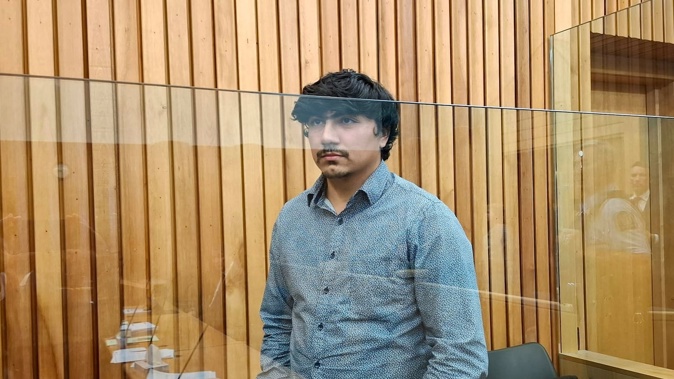
Warning: This story deals with details of sexual violence and may be distressing.
A sexual predator who groomed a Rotorua 13-year-old on Snapchat then raped her was on bail at the time awaiting trial for similar offending in Tauranga.
It took more than two years for Raveen Saily’s trial to be heard in Tauranga – prompting concerns from a victims’ advocate around court wait times and bail conditions.
Rotorua and Tauranga courthouses have longer than the national average wait time for serious trials but the Ministry of Justice says it is working on speeding up the process.
Saily was jailed in December last year for nine years and two months for the rape and sexual violation of a 16-year-old girl in public changing rooms at Arataki, near Mount Maunganui.
He first groomed the girl on the social media app Snapchat before arranging to meet her at Bayfair in October 2021.
They walked to Arataki Skatepark, where he pulled her inside the changing rooms and told her he had a knife before raping and sexually assaulting her. It was her first sexual encounter.
 The Arataki Community Centre public changing rooms where a 16-year-old was raped by Raveen Saily. Photo / Hannah Bartlett
The Arataki Community Centre public changing rooms where a 16-year-old was raped by Raveen Saily. Photo / Hannah Bartlett
Police tracked him down in April 2022 and his case was tried in the Tauranga District Court in August last year.
It was revealed at trial that Saily used the alias “John” and had several different Snapchat accounts.
Three months before standing trial, Saily offended again, this time in Rotorua.
This was despite bail conditions banning him from accessing the internet, having contact with anyone under 16 or leaving his Pyes Pā home at night.
He added the Rotorua 13-year-old on Snapchat in May, claiming he was only 16. He groomed her over a month and encouraged her to send him sexually explicit photographs.
They met at night in June and he drove her to several private locations where he raped and violated her, at times as she cried in pain.
She repeatedly told him to stop but he told her to shut up. It was her first experience of sexual intercourse.
He pleaded guilty last week to charges including grooming for sexual conduct with a young person, sexual connection with a young person, sexual violation by unlawful sexual connection and possessing objectionable material. He is due to be sentenced in December.
 Raveen Saily used Snapchat to groom teen girls. Photo / Getty Images
Raveen Saily used Snapchat to groom teen girls. Photo / Getty Images
Sexual abuse victims advocate Louise Nicholas said the Rotorua offending wouldn’t have happened if there hadn’t been such a long delay at the Tauranga District Court.
She also called for more electronically monitored bail for sexual offenders.
“I see it time and time again.”
Speaking generally, she said having sexual abuse trials as “reserves” for court scheduling also added to the stress for victims and their families as those dates weren’t guaranteed.
A reserve trial only starts if the fixed trials don’t go ahead.
 Louise Nicholas is an advocate for victims. Photo / Michael Craig
Louise Nicholas is an advocate for victims. Photo / Michael Craig
“They get geared up emotionally to give evidence only to be told on the day it’s not going ahead.”
She said given the long waits for trials, defendants were often granted bail, but she said more consideration needed to be given for serious sexual offenders to be in custody or on electronically monitored (EM) bail – whereby Community Corrections tracks defendants with GPS.
Nicholas said overnight curfews were monitored by police, who didn’t have time to regularly check.
“Yes defendants are innocent until proven guilty, I get that, but if there is enough evidence to bring charges we need to keep the community safe by considering EM bail more often.”
 The Rotorua and Tauranga courthouses. Photo / NZME
The Rotorua and Tauranga courthouses. Photo / NZME
Ministry of Justice courts and tribunals regional service delivery acting group manager Eve Padgett said the average wait time until the end of a category three case (those with maximum jail terms of two or more years) was 711 days in the Rotorua District Court and 777 in the Tauranga District Court.
The national average is 706 days.
She said delays were caused by an increase in serious and complex cases, people pleading guilty later in the process, more people electing jury trials over judge-alone trials, more adjournments because of parties not being prepared and court staffing pressures.
She said several initiatives were under way to improve the wait times.
These included the Chief District Court Judge issuing a new category-based timeliness threshold.
For category three cases, 90% of criminal cases should be disposed of within 15 months (about 456 days).
The ministry was prioritising rostering and scheduling to target judicial and justice sector resources at district courts with the largest backlog of cases. Judicial resources and courtrooms were being reprioritised to address the backlog of cases.
Where to get help:
If it’s an emergency and you feel that you or someone else is at risk, call 111.
If you’ve ever experienced sexual assault or abuse and need to talk to someone, contact Safe to Talk confidentially, any time 24/7:
- Call 0800 044 334
- Text 4334
- Email [email protected]
- For more info or to web chat visit safetotalk.nz
Alternatively, contact your local police station – click here for a list.
Kelly Makiha is a senior journalist who has reported for the Rotorua Daily Post for more than 25 years, covering mainly police, court, human interest and social issues.
Take your Radio, Podcasts and Music with you









